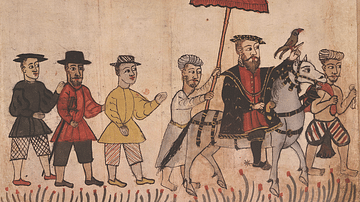


In Portugal, the territory became controlled by the Germanic in the 5th century. This lasted until the Barbarian invasions, when Germanic tribes migrated to various parts of the Roman Empire. The Romans left various works, such as baths, temples, bridges, roads, theaters and statues, some of them are still found in the different parts of the country. The tribe was considered a worthy adversary by the Romans, so much that they named the province of the whole territory of modern Portugal (south of the Douro River) and part of western Spain after them. They were known for successfully fending off the Roman armies until the death of their leader, Viriathus, known as a hero in Portugal. This is why today we have names like Lusophone, someone who speaks Portuguese, or Luso-American, a Portuguese American person. The Lusitanians, who inhabited the interior region of Portugal since the Iron Age, are considered the forefathers of the Portuguese nation. Then, in the beginning of the first millennium BC, Celtic tribes invaded and intermarried with the local Iberians, creating what is now known as the Celtiberians.

Is to understand the streets that you will walk through when you visit it, the beautiful monuments you will see in every corner, the tales told in the ‘ azulejos’ of the Churches and the houses.Īnd that history starts many ages ago, when the so-called Iberian tribes inhabited the territory of today’s Portugal. To know the history of Portugal is to know the mentality and mindset of the Portuguese. It’s history is the combination of the story of Iberian tribes, Celtic peoples, the Roman Empire, Germanic kingdoms, Muslim invasions and the consequent Christian Reconquista, and finally, of the Exploration of the World. Portugal is one of the oldest countries in Europe. And you can only do that by knowing its history. I think that you can only have the full experience that a country has to offer when you understand the things that you see in it.


 0 kommentar(er)
0 kommentar(er)
